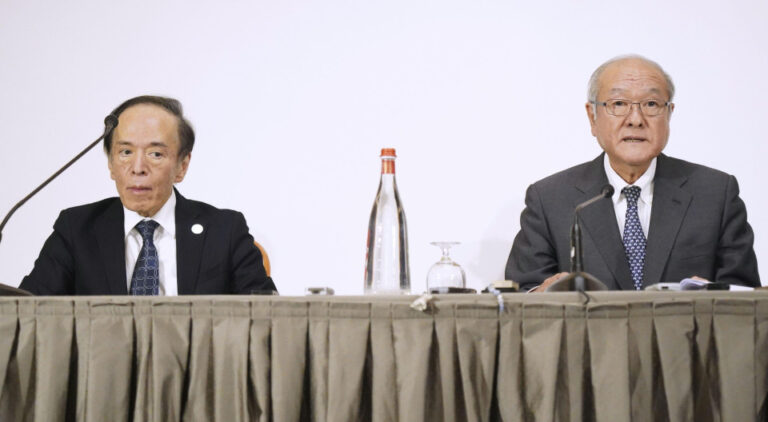In an unusual move amid rising tensions between the United States and China, finance ministers and central bank governors from the Group of Seven countries on Saturday singled out the Asian powerhouse specifically, expressing concern over Chinese industrial policies that are flooding global markets with overproduced goods.
Although G7 finance ministers and central bank governors made “progress” at their meeting in Italy, they failed to agree on using proceeds from frozen Russian assets to help rebuild Ukraine, leaving the decision to their leaders when they meet again in June.
Finance Minister Shunichi Suzuki said at a news conference after the meeting that the G7 reaffirmed its existing commitment to ensure stable movements in foreign exchange markets because excessive volatility has a negative impact on the global economy.

Finance Minister Shunichi Suzuki (right) and Bank of Japan Governor Kazuo Ueda hold a press conference in northern Italy on May 25, 2024. (Kyodo)
The inclusion of this commitment is seen as important for Japan, which has been closely monitoring excessive volatility in currency markets as the yen continues to weaken despite suspected market intervention by Japanese authorities in recent months.
Finance ministers from Britain, Canada, Germany, France, Italy, Japan, the United States and the European Union criticized China in strong terms.
“While we reaffirm our interest in balanced reciprocal cooperation, we express concern at China’s full use of non-market policies and practices that undermine the resilience of workers, industries and economies,” the G7 said in a joint statement.
The United States in particular has issues with Chinese practices, including heavy government subsidies, that allow overproduction of low-cost products and have an impact on the world’s largest economy.
US President Joe Biden has announced a series of tariff hikes on Chinese imports, including electric vehicles, semiconductors and other strategically important items, as he looks to launch his next term as president.
Another important issue was how the G7 would continue to support Ukraine.
While pledging its unwavering support for Kiev, the group is also exploring the possibility of using revenue from Russian state assets frozen as part of sanctions to hit the country’s military finances.
“We reaffirm that Russian state assets under our jurisdiction will remain immobile until Russia compensates Ukraine for the damage it has caused, in accordance with our respective legal systems,” the G7 said, condemning Moscow’s “unjust and unprovoked” war.
Italian Finance Minister Giancarlo Giorgetti said at a separate news conference that the G7 was working hard to reach an agreement but the task would be “not easy.”
The G7 summit is scheduled to take place in the Italian region of Puglia from June 13 to 15.
“I conveyed to the meeting that the use of frozen assets should be based on the scope permitted by international law and that this should also be taken up at the summit,” Suzuki said.
Related article:
Many G7 nations express concern over Chinese overcapacity
Japan sanctions Russian group over North Korea arms procurement
U.S. and China express concerns at first dialogue on safe use of AI

